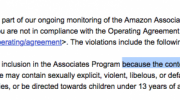 I have been struggling with these words for a while. In my head, I know there’s a phraseology that should be simple, wrap it all up like a neat little package, festooned with chastisement and guilt and semen and blind thrusts. It is an obsession, mine, to name their obsession.
I have been struggling with these words for a while. In my head, I know there’s a phraseology that should be simple, wrap it all up like a neat little package, festooned with chastisement and guilt and semen and blind thrusts. It is an obsession, mine, to name their obsession.
Last week Massachusetts joined six other states and decided to decline the yearly allotment of the US government’s $700,000 per-state grant for abstinence education in public schools (which discourages the use of birth control, such as condoms). This was just after a 20-page Columbia University study exposed that abstinence curriculum statements about condom use are medically inaccurate — and the ACLU, tired of the Department of Health and Human Services ignoring repeated warnings about their incorrect data, sent them a letter threatening legal action. Last friday, Randall Tobias, Bush’s notoriously abstinence-promoting, condom-discouraging “AIDS Czar” and Deputy Secretary of State, resigned after admitting he was a customer of the Washington DC escort service about to surrender their records, and also a customer of a service that “specialized in Central American women”.
The devil is in the data.
While looking over the news item about Massachusetts, this snip caught my eye:
The grant program that funds abstinence education was created by Congress in 1996 as part of welfare law changes, with the aim of discouraging teenagers from having sex outside marriage. Most states took the money and at first were allowed wide flexibility in how they used the funds. Until 2003, Massachusetts used the money for public service announcements encouraging teenagers to wait for marriage before having sex. The state then began spending the money on supplementary educational materials promoting abstinence.
In late 2005, Romney — then a potential presidential candidate who was trying to establish credentials as a social conservative — announced that he would channel the money directly into expanding abstinence education programs in schools. During the remainder of his administration, Massachusetts funneled more than $800,000 to Healthy Futures, a group that had been running abstinence education programs in more than three dozen middle schools.
Wow, $800K is a lot of money. On the article’s second page, they say that “Healthy Futures is a subsidiary of a Christian, anti abortion group called A Woman’s Concern, but [Rebecca] Ray said the curriculum is not religious and does not tell students what to think about abortion.” I also unearthed that Healthy Futures got a $1.5M grant in 2004 from the US Department of Health and Human Services. So I thought, okay, I have a lot of negative fantasies about what the actual curricula of these organizations are teaching, so I decided to look at Healthy Futures’ .pdfs — and didn’t find much at all about what they’re actually telling the kids. But I did learn a lot on their Research Reports and Studies page — mostly that they have a lot of broken links to studies that support abstinence and discourage condom use. What really caught my eye was one of the unbroken links, to a .pdf where they state, “According to a recent report, sexually-active teens are more likely to be depressed and attempt suicide.”
I downloaded the 10-page study on teen sex and suicide, and read it. I didn’t need to read far to get more answers than I anticipated: on page two, it’s proudly authored by right-wing, “conservative think tank” The Heritage Foundation. On page three, it states that the data is based on a Heritage study from 1995-1996. Skewed, *and* out of date.
Much like the medically inaccurate data the ACLU is trying to get the US Department of Health and Human Services to stop using — because doing so violates federal law. The Washington Post examines the government reaction to the charges, and we get this juicy snip:
HHS spokeswoman Christina Pearson said agency officials had not reviewed the letter and other materials yet. “As a general statement,” she said, “I do want to note that our abstinence programs have been, and will continue to be, medically accurate, teaching young people about the healthier choices they can make in life.”
The department’s Administration for Children and Families (ACF) provides technical assistance to grantees and monitors the accuracy of their educational materials, Pearson said. The government spends $176 million a year on abstinence programs.
The materials have been the subject of political and legal battles for years, with critics, including Rep. Henry A. Waxman (D-Calif.), contending that the Bush administration has ignored inaccuracies in the service of conservative ideology.
Wow, now we’re up to $176 million a year. Is that anywhere near what Randall Tobias made as the head of Eli Lilly?
Tobias was an outcall John — who spent the last several years enacting global and domestic policies about abstinence and anti-condom propaganda to people whose lives depend on accurate information about protection and staying alive. Do you think he used condoms, or did he pay extra to go bare? I’m thinking he had a little extra cash to go bareback, especially considering his statements in 2004,
(…) promoting abstinence and monogamy are “far more effective” than distributing condoms for preventing the spread of HIV, according to Agence France-Presse. “Statistics show that condoms really have not been very effective,” Tobias said, adding, “It’s been the principal prevention device for the last 20 years, and I think one needs only to look at what’s happening with the infection rates in the world to recognize that has not been working.”
In all this tangled web of inaccurate (and possibly falsified) data, hypocrisy and piles of money moving around (oh, and skyrocketing HIV rates in Africa and ever-increasing volumes of sex hotline questions at SFSI from teens) — is one very loud sound. Never has it been more clear that church and state are now one and the same.
The thing I’m trying to name is Tobias’ brand of “sex addiction” — not that he used sex workers and is a hypocrite (he is), or the notion that him starting some kind of 12-step program would alleviate his guilt for something “out of his control” (a likely out). No. It’s his obsession with enforcing his sexual hypocrisy on the world that needs a name. It’s a pathological drive that fuels Gonzales’ war on porn, too. And the freaks obsessed with putting a stop to gay marriage (Heritage Foundation). Don’t you think that the people who spend all their time creating giant signs with bloody aborted fetuses and making their children hold them in front of abortion clinics are kind of fucked up? These are *all the same people*. These people are more obsessed, worried and fetishized-possessed about sex than those of us who spend our lives studying it. It’s just unhealthy. And they act on their desires, unchecked, from policy to practice.
There’s got to be a name for their disorder. Email me if you made it through this long and overly-serious post and you have suggestions. But I do know one thing — their problem *does* have a name now — mine.
I got the check in the mail for the Oprah piece. It’s all set. A pro-porn piece (and a profile) in one of the widest-read magazines in the nation. My anti-porn opponents would kill for the same. They know where to find me.
Image via Stockroom’s eloquent Goedde galleries.
Updates 5.1: Reader Dan emails me to say, “Hey, something in your recent missive caught my eye:
Wow, $800K is a lot of money. On the article’s second page, they say
that
“Healthy Futures is a subsidiary of a Christian, anti abortion group
called A Woman’s Concern, but [Rebecca] Ray said the curriculum is not
religious and does not tell students what to think about abortion.”
“A Woman’s Concern” is Erik Keroack‘s clinic. You may remember Keroack as
the anti-contraception wacko who was leading up the Health and Human
Services Office of Population Affairs, who was forced to resign when his
practice was being investigated for Medicaid fraud.
Wow. Talk about blatant graft. This one might even make a good SFGate
article.”
* Sweet London reader Adam writes, “There is of course this report, $1bn ‘don’t have sex’ campaign a flop as research shows teenagers ignore lessons, which fully debunks Bush’s War on Pleasure.
* Vamp tells me, “Not that this is too creative, but I would call these people
Erotophobic and Paraphobic. I love the webpage for Paraphobia here.
where it states that “Paraphobia is an intense fear of something that
poses no actual danger [to oneself].” I think this describes these
people in many other realms in their life.
It goes on to say:
“There is a Way Out. Imagine what your life will be like when you
know that you are not ‘defective’.” This is something that I would
love to tell fundamental Christian conservatives! Alas, I know none.
Keep up the great blogging.”
* Reader Jessi emails me a very interesting conversation from this morning, “My friend and I discussed how to categorize sex negative zealots this morning and came up with two interesting descriptors: “Obsessive Erotiphobes” for the actual people and “Reaction Formation” to describe the underlying psychological mechanisms. Here is a snip our conversation for further clarification:
Jessi: What do you think about the term: “Obsessive Erotiphobe” ?
As a psychologist, what does it make you think of?
hypnautika: erm, breaking it down it looks like fear or eroticism but the obsessive throws me off
persistent thoughts of eroticism that are feared and avoided?
with an accompanying compulsion?
Jessi: It’s describing all the people out there who constantly throw out sex negative messages in a compulsive manner
hypnautika: hmmm do you have to be phobic to be sex-negative?
Jessi: I think it stems from a fear of sex
They want to avoid it and are obsessed with regulating everyone else and forcing social aversion
hypnautika: Ah
“reaction formation” would be more psych appropriate
turning an unacceptable impulse into its opposite
Jessi: How so?
hypnautika: “A defense mechanism, operating unconsciously, in which a person adopts affects, ideas, and behaviours that are the opposites of impulses harboured either consciously or unconsciously. For example, excessive moral zeal may be a reaction to strong but repressed asocial impulses.”
So it’s not appropriate to want sex, so I speak out vehemently against it. This is why we frequently find homoerotic child pornography in the basements of angry southern republicans.
Also, this kind of behavior could probably be correlated with specific personality traits. In 2000, Dr. Herek published a study called “The Psychology of Sexual Prejudice“* that looked at the correlations between certain traits and homophobic opinions and beliefs. The study found that sexually prejudiced people were less likely to reside in urban areas or have personal contact with people of non-heterosexual orientations. More importantly, the study found that sexually prejudiced subjects had authoritarian personalities and expressed high levels of religiosity. While I don’t have any specific data to expand these findings to other groups like Healthy Futures, pro-life moms putting pictures of dead fetuses on their children, or the hypocrisy of Randall Tobias, their actions are all rooted in their obsessiveness with enforcing their sexual mores on everyone else. This is very similar to the way that sexually prejudiced people work so hard at denying rights to those who violate their sense of sexual appropriateness. It would be interesting to see a study that measured the same personality traits for the groups listed in your post.
I could go on for awhile about this, but I’m sure you’re incredibly busy with your work, so I’ll just bring up one more point about why I think there is an increasing amount of tension with these groups: the internet. The ever growing onslaught of information provides people with easier access to ideas and information that are contrary to the bourgeois messages of abstinence. While people have always engaged in a wide variety of sexual expressions, there have never been so many easy forums for people of similar thought to come together and form communities. I really feel that this gives people more free agency and confidence to explore their desires in a safer manner. (Though, at the same time it can have the reverse effect of providing access to conflicting and false information and most people can’t tell the difference) All of this together is forcing rapid change in the way that we imagine and understand sexuality, and this upheaval is very scary for those who adhere to established traditional ideas so they want to maintain the boundaries they are familiar with instead of treading into ambiguity.
Sorry for the super long response, but I’m fascinated with public debates on sex information and public ideas about appropriate behavior.”




